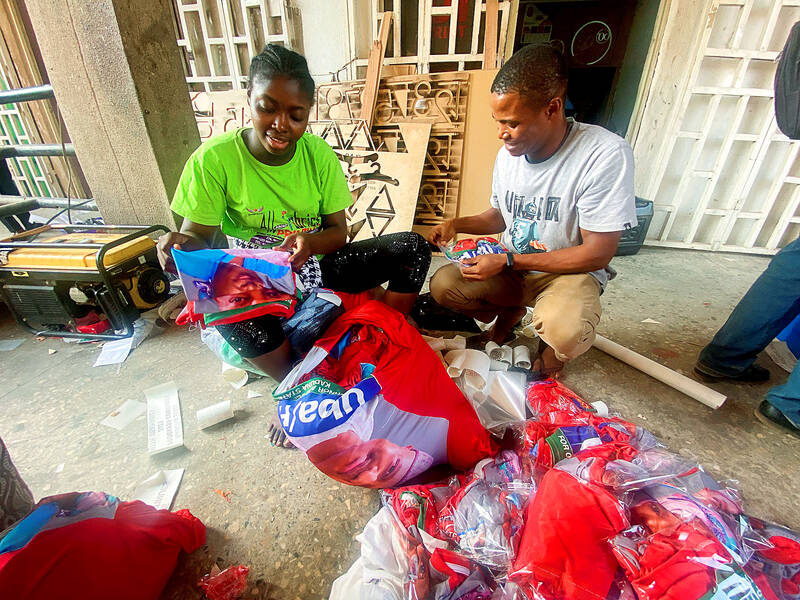A loud whir filled the back of a print shop in Nigeria’s capital, Abuja, as machines churn out grinning faces of presidential election front-runners on posters, flyers and food packaging.
Workers poured cassava flour into blue-and-green bags sporting the governing All Progressives Congress party’s acronym and stashed them next to a pile of red-and-green opposition rice packets. The advertising campaign season is in full throttle.
The run-up to a vote is usually a chance for small businesses like Shimatex Prints to cash in on election paraphernalia ranging from hats and flip-flops to tissue boxes and cooking oil labels.

Photo: Reuters
However, business has been slower than usual ahead of the Feb. 25 vote, as candidates have hinged more campaigning on social media.
“Printing-wise [there is] not much difference in our orders,” Shimatex Prints CEO Joel Mtsor said, recalling busier periods around 2011, 2015 and 2019 polls.
“A few souvenirs, a few campaign materials, a few billboards, but the impact on the print industry is not as good as it was,” he said.
Nigerians are to vote for a new leader to replace President Muhammadu Buhari amid growing insecurity and economic hardship. The three front-runners have promised to reduce living costs, boost growth and tackle rising levels of violence.
As Africa’s most populous country, Nigeria is home to tens of millions of Internet users, prompting candidates to compete for voters’ eyeballs across popular platforms such as Facebook, TikTok, Twitter and YouTube.
Social media has been a key campaigning tool ahead of a poll in which almost 40 percent of registered voters are 34 or younger, electoral commission data showed.
However, not everything has moved online, as parties still commission political regalia for rallies and other in-person campaign events.
At a printing mall in Abuja’s business hub, workers pasted party logos on baseball caps and sew candidates’ portraits onto T-shirts. Bold political slogans flashed from white scarves hanging in the background.
“It is what we want ... the most craziest of orders for a printer is a good job,” print shop owner Opeyemi Osho-Arilomo said.

China yesterday held a low-key memorial ceremony for the 1937 Nanjing Massacre, with Chinese President Xi Jinping (習近平) not attending, despite a diplomatic crisis between Beijing and Tokyo over Taiwan. Beijing has raged at Tokyo since Japanese Prime Minister Sanae Takaichi last month said that a hypothetical Chinese attack on Taiwan could trigger a military response from Japan. China and Japan have long sparred over their painful history. China consistently reminds its people of the 1937 Nanjing Massacre, in which it says Japanese troops killed 300,000 people in what was then its capital. A post-World War II Allied tribunal put the death toll

FALLEN: The nine soldiers who were killed while carrying out combat and engineering tasks in Russia were given the title of Hero of the Democratic People’s Republic of Korea North Korean leader Kim Jong-un attended a welcoming ceremony for an army engineering unit that had returned home after carrying out duties in Russia, North Korean state media KCNA reported on Saturday. In a speech carried by KCNA, Kim praised officers and soldiers of the 528th Regiment of Engineers of the Korean People’s Army (KPA) for “heroic” conduct and “mass heroism” in fulfilling orders issued by the ruling Workers’ Party of Korea during a 120-day overseas deployment. Video footage released by North Korea showed uniformed soldiers disembarking from an aircraft, Kim hugging a soldier seated in a wheelchair, and soldiers and officials

‘NO AMNESTY’: Tens of thousands of people joined the rally against a bill that would slash the former president’s prison term; President Lula has said he would veto the bill Tens of thousands of Brazilians on Sunday demonstrated against a bill that advanced in Congress this week that would reduce the time former president Jair Bolsonaro spends behind bars following his sentence of more than 27 years for attempting a coup. Protests took place in the capital, Brasilia, and in other major cities across the nation, including Sao Paulo, Florianopolis, Salvador and Recife. On Copacabana’s boardwalk in Rio de Janeiro, crowds composed of left-wing voters chanted “No amnesty” and “Out with Hugo Motta,” a reference to the speaker of the lower house, which approved the bill on Wednesday last week. It is

Cozy knits, sparkly bobbles and Santa hats were all the canine rage on Sunday, as hundreds of sausage dogs and their owners converged on central London for an annual parade and get-together. The dachshunds’ gathering in London’s Hyde Park came after a previous “Sausage Walk” planned for Halloween had to be postponed, because it had become so popular organizers needed to apply for an events licence. “It was going to be too much fun so they canceled it,” laughed Nicky Bailey, the owner of three sausage dogs: Una and her two 19-week-old puppies Ember and Finnegan, wearing matching red coats and silver